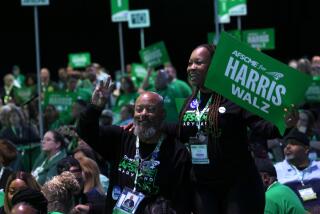Good News for Bird in USC Survey : Independent Courts Backed in Poll
- Share via
By a 2-1 margin, Californians believe that a judge should be “independent” from political pressures and not be held “accountable” at election time to the views of voters.
These findings of a public opinion poll by USC’s Institute of Politics and Government should be good news for California Chief Justice Rose Elizabeth Bird, who is emphasizing the theme of judicial independence in her bitterly fought confirmation campaign.
But the sampling of California voters also showed that Bird may be held in less esteem than the concept of judicial independence. The poll found opponents of the chief justice outnumber supporters 39% to 29%, with the remainder undecided. This split is almost unchanged from a similar USC poll conducted last February and is close to the margins measured by the Los Angeles Times Poll in June.
The USC survey asked voters about the idea of an independent judiciary and whether judges should be elected solely on the basis of their qualifications and competence. Sixty-two percent said yes. Thirty percent said otherwise, that judges should be held accountable in their rulings to the views of voters.
In June, the Los Angeles Times Poll directed by I. A. Lewis probed this matter of judicial independence versus judicial accountability somewhat differently, asking voters to apply their thinking directly to Bird. In response, 39% of the voters felt she should be more responsive to the wishes of voters while 28% said she should remain independent of politics.
As for other Supreme Court justices up for confirmation in November, 1986, the USC poll found that nearly two-thirds of the electorate is undecided. Confirmation of Justice Joseph R. Grodin was favored 22% to 13%, Malcolm M. Lucas 21% to 12%, Stanley Mosk 25% to 13% and Cruz Reynoso 19% to 17%. Recently appointed Justice Edward A. Panelli was not listed in the poll.
Larry L. Berg, director of the USC Institute of Politics and Government, conducted the sampling in conjunction with Common Cause, a nonpartisan group.
More to Read
Get the L.A. Times Politics newsletter
Deeply reported insights into legislation, politics and policy from Sacramento, Washington and beyond. In your inbox three times per week.
You may occasionally receive promotional content from the Los Angeles Times.










